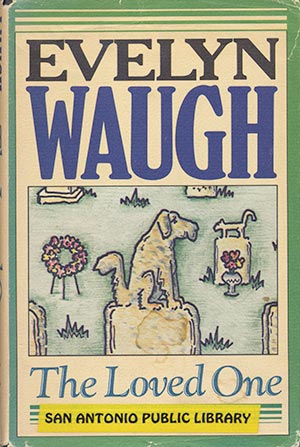As of today, I’ve completed 48,000 of the 50,000 words required to “win” NaNoWriMo — National Novel Writing Month. It looks like my novel will be more in the 75,000 word range. I feel like one of those marathon runners who doesn’t realize he’s crossed the finish line and keeps on going because his legs have gotten used to the idea of running. In my case, the logic of the story has taken hold and I don’t have a choice but to keep writing until the logic plays itself out. Notwithstanding the finger-typing flurry, I sometimes have to take a break to do some research. I’m of the view that writing a novel in two or three weeks is no excuse for getting the facts wrong.

Since my novel is a macabre piece that includes embalming, funeral homes, gutting deer, and burying a body in a farmer’s field, I thought it might be helpful to look at other novels that touch on similar themes. Evelyn Waugh’s satirical novella, The Loved One, immediately comes to mind. At right is an image of my copy, which has a sticker on the cover indicating that it was liberated from the San Antonio Public Library. Its pedigree alone was worth the four dollars I paid for it. How did it escape the San Antonio Public Library? Under the jacket of some crazy reader with a Waugh fetish? Or was its escape more mundane, getting mixed up in a box of books when the borrower moved? Or even more mundane: did the library simply sell it at an annual fund-raising book sale? I’d like to think it was stolen. Then there’s the question of how the book ended up in another country, in a used book store on the shores of Lake Simcoe. Did it ride in a bag on the back of a Harley Davidson? Was it somebody’s in-flight reading, discarded or given away when the plane landed? Who else read the book before it fell into my hands? A Hog-riding professor of English literature? A lonely grandmother visiting her family? A sex-trade worker with a couple hours to spare? Anything is possible.
But on to the book.
The most important thing to know about The Loved One is that Evelyn Waugh is dead and has been that way for forty-four years. I have no idea how he died. However, in The Loved One, Dennis Barlow’s uncle, Sir Francis Hinsley, hangs himself, and the love interest named Aimée Thanatogenos, who is a makeup artist at Whispering Glades funeral home, OD’s on barbiturates. So at least we know how Waugh’s characters died.
Dennis Barlow is a failed poet and British ex-pat living in California who woos Miss Thanatogenos with bits of other people’s verse that he passes off as his own. To make ends meet, he works at the Happier Hunting Ground, a crematorium for pets. Unfortunately for Dennis, the Happier Hunting Ground is a second rank outfit and a source of embarrassment for him in his pursuit of the lovely Miss Thanatogenous. His rival is the mortician at Whispering Glades, the preeminent Mr. Joyboy. Dennis just doesn’t measure up.
At the time of its publication in 1948, The Loved One was criticized as too morbid. Waugh was poking fun at the Disneyfication of the funeral business. Now, it’s a commonplace to observe how kitsch has invaded the business of death and the disposal of bodies. Funerals have always been a time when people come together to share the most insipid of their platitudes and the most saccharine of their sentiments. But now technology has crept into the mix. We crank up the volume of our platitudes and digitize our sentiments.
This change presents a problem for satirists. Satire exaggerates an existing state of affairs. That’s its modus operandi. In so doing, it brings to light the absurd within that state of affairs. But satire loses its edge when the subject matter is already so absurd on its face that it no longer needs any help from a clever author. A case in point is the attempt to skewer extreme Christian fundamentalism. It becomes impossible to see the satire because it’s indistinguishable from the real thing. It may be that, sixty-two years later, the times have caught up with Waugh and what began as an edgy satire has been overwhelmed by today’s self-satirizing funeral business.
If Waugh’s writing was too macabre at the time, then (as you shall see) mine is positively gruesome by comparison. Maybe I’ve gotten caught up in a conversation that gets louder and louder as it goes on. Waugh’s satire doesn’t take hold anymore because we’ve grown desensitized to the way we deal with our dead. And so I yell louder, but the absurdity inherent in my writing will also lose its bite because we will all develop even more immunities.
